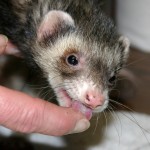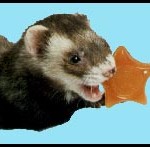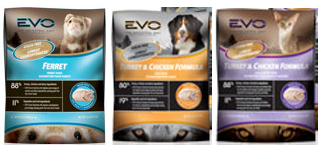There are two main issues when you bring another ferret into the house, whether it’s from the shelter, a pet store or from your friend down the street. First, compatibility and second, health.

Ferrets meeting
Not all ferrets get along with each other. Some are enthusiastically happy to have a friend to play with, others would rather not be bothered but aren’t overly upset, but some seem to think their job is to rid the world of all other ferrets!
Some ferrets will, in time, come to accept a new ferret. There are various tricks and things you can try. One of the most successful seems to be giving all parties involved a bath and putting the same scent on all the ferrets. Some people swear by vanilla (especially if ferrets already like Ferretone, which uses vanilla as a flavoring). Some say they dab on their own perfume and that does the trick. Others say the bath alone is enough (misery loves company, maybe?).
Another good technique is to introduce the ferrets on neutral territory — that is, some place that none of the ferrets involved call “home.” If you normally let your ferrets play in the livingroom, you might try introducing new ferrets in a bedroom. However, it’s much easier to separate warring parties if you introduce them somewhere you have easy access to all corners of the room. It’s not much fun to be crawling under the bed or behind the couch, trying to grab two very angry, screaming weasels! Best to pick a place with no large pieces of furniture, but perhaps some small boxes or tubes for ferrets to hide in if they need a break.
Also, when ferrets don’t get along, you’ll often see what we call “flying poop.” That’s when two ferrets are attached to each other, screaming and biting, all fur fluffed, rolling around, and one or both poops. The result is that poop goes flying all over the place, hence “flying poop.” This is a sign one or both ferrets are REALLY upset. You really don’t want to be climbing around on the floor, through this poop, trying to reach very upset ferrets that will just as soon bite you as anything else. This is a very good reason to leave the introducing to be done at the shelter. We’ve seen this before, we know how to stop it, and most importantly, we know what portion of the ferret to grab to decrease the chance of a bite. If you have to do it yourself, grabbing the tail of each ferret and having a helper pour cold water on their heads is almost always successful. Usually you don’t have to get that extreme. Usually grabbing tails is enough to get them to let go, and it’s usually pretty obvious which ferret is the aggressor and which really, truly just wants to go hide.
The second issue, health, can be serious if you’re not careful. If all ferrets involved are young and basically healthy and have tested negative to ADV, most likely nothing serious will happen. But if you have an older ferret at home and bring in a ferret with new germs, your older ferret could get sick enough for it to be life-threatening. Quite common is for the current ferrets to get the runs from some new germ brought into the house. Frankly, this can happen if all you do is pet the baby ferrets at the pet store! Diarrhea can be dangerous to an older or sickly ferret. Often you don’t even know your ferret has an underlying problem. The new ferret could get sick, or both could get sick (introducing a new ferret is stressful, and stress often brings on illness in ferrets).
If the ferrets involved are healthy, usually nothing happens, or one or both might have the runs for a couple days and then everything is fine. If the runs last for more than 2 or 3 days, or the ferrets become dehydrated (the skin should fall back immediately after it’s been pinched on the scruff, if it doesn’t, they’re dehydrated), they need to see the vet.
Sometimes just having another ferret around will stress one or both to the point where they’ll get ulcers. If you see a ferret with black, tarry poop, it’s time to take them to the vet asap. That’s *blood* in the stool, probably coming from the stomach, and they will die if it isn’t treated. If you see red blood in the stool (it?s not blood if it stays red for over 30 minutes) that’s also a reason for an immediate trip to the vet.
It’s really a good idea to talk to a shelter operator before introducing a new ferret. Shelters have done it many times, they’ve seen all the possible reactions, and most shelter operators know the symptoms of a serious health problem. Many introductions go just fine; others are a bit bumpier. Sometimes you grab the ferrets, brush off the poop, comfort them for a while, and they forget it. Other times you separate the ferrets, brush off the poop, and forget about trying to introduce them. It’s not worth bloodshed.
If you want to bring more ferrets into your house, you need to be prepared in case they don’t all get along. You may need to set up separate cages and arrange separate play times. Can you deal with that?
If you adopt a ferret from the Hide-E-Hole and if, within the first two weeks, it becomes obvious that it is not working out, we are happy to take the ferret back and refund your money.
 I get many requests from people looking for the youngest ferret they can find. Many have children, many are not experienced in living with ferrets, and many seem to think you need to get them young to get a good ferret.
I get many requests from people looking for the youngest ferret they can find. Many have children, many are not experienced in living with ferrets, and many seem to think you need to get them young to get a good ferret.


 Who doesn’t love ferrets? I know I do. Cute, cuddly, and full of personality. When I found Hide-E-Hole Ferret Rescue late one night while searching through Google I was touched by the commitment and effort the site owner (Barb Carlson) was giving to these lovable critters. Barb’s site definitely needed some TLC as well, so I offered to help out. By a twist of fate (or ferret manipulation) I ended up becoming the “webmaster” and now I am currently working on getting this site organized.
Who doesn’t love ferrets? I know I do. Cute, cuddly, and full of personality. When I found Hide-E-Hole Ferret Rescue late one night while searching through Google I was touched by the commitment and effort the site owner (Barb Carlson) was giving to these lovable critters. Barb’s site definitely needed some TLC as well, so I offered to help out. By a twist of fate (or ferret manipulation) I ended up becoming the “webmaster” and now I am currently working on getting this site organized. 


